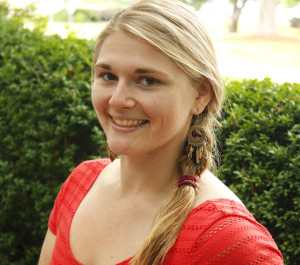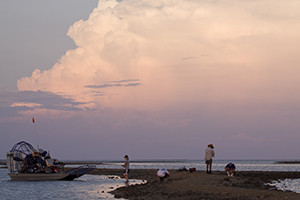
Hannah Brown
Hannah Brown, a Ph.D. student in interdisciplinary ecology at the University of Florida, has been named the first Nature Coast Biological Station/Florida Sea Grant Scholar.
The newly established scholarship program recognizes an outstanding graduate student at UF who conducts applied research in the Nature Coast area, which spans the Gulf Coast from Wakulla County to Hernando County. The program provides $10,000 of support per year—two years for master’s students and three years for Ph.D. students.
Brown’s dissertation research is focused on oyster restoration projects along the Gulf Coast and how various stakeholders involved in those projects communicate and network.
“There are many restoration initiatives spearheaded by different groups in this region, but the documentation of those projects hasn’t been very detailed or interconnected,” Brown said. “The goal of my project is to assess how the knowledge about restoration projects, held by oyster growers, coastal managers and scientists, is shared between groups, and to make recommendations for future efforts.”
The scholarship program is associated with the new Nature Coast Biological Station in Cedar Key, a UF/IFAS initiative to help conserve and improve management of natural resources along the Gulf Coast, so naturally Brown’s research was a perfect fit.

Brown is researching how various stakeholders that are involved in oyster restoration projects along the Gulf Coast communicate and network. UF/IFAS Photo by Tyler Jones
“She is using a set of surveys to assess the impact of community involvement in a set of inshore artificial reefs,” said Micheal Allen, the station’s director. “Her work seeks to evaluate how improvement of natural resources influences communities of the region, and thus is clearly tied to the shared objectives of the Nature Coast Biological Station and Florida Sea Grant.”
Brown’s adviser, Susan Jacobson, distinguished teaching scholar and professor in UF’s Department of Wildlife Ecology, agreed.
“It is an important and innovative study, which has direct application and the ability to improve management of coastal natural resources and ecosystems” said Jacobson.
Brown received her bachelor’s degree in psychology from the New College of Florida, and her master’s degree in mass communication from UF. While pursuing her master’s degree, she also was a teaching assistant for a multimedia writing class. Her master’s thesis focused on the impacts of media coverage about the Deepwater Horizon Oil Spill on fishermen in Apalachicola, Cedar Key and New Orleans.
She currently holds a graduate assistantship at UF’s School of Natural Resources and Environment, where she writes news stories and manages social media for the department. In her future career, Brown hopes to put her science writing and teaching skills to work.
“I am interested in working both as a science journalist and as a professor of environmental communication,” she said. “I feel that there is a lot of room for improvement in the ways that groups come together and share knowledge about environmental issues and topics. I am interested in studying those dynamics as well as producing my own journalistic articles about environmental research.”
The Florida native says her love affair with water started as a young child, where she spent a great deal of time sailing off the coast of Amelia Island with her family.
“These experiences are deeply ingrained in me and have had a big impact on the choices I have made professionally,” Brown said. “I am very honored to receive this award and to be affiliated with Florida Sea Grant and Nature Coast Biological Station. I admire both of these organizations greatly, and I am looking forward to collaborating.”



